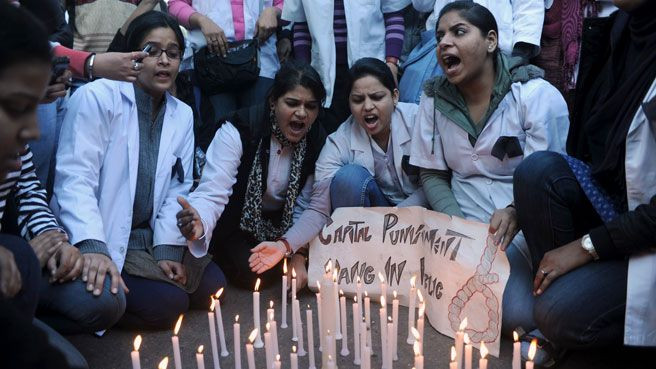Delhi Gang Rape Case Of 2012: India Bans Broadcast Of Controversial BBC Documentary

India on Wednesday banned the broadcast of a BBC documentary titled "India’s Daughter" featuring an interview with a man who was one of those accused of gang-raping a 23-year-old woman on a New Delhi bus in December 2012.
India's Home Minister Rajnath Singh said in parliament on Wednesday that the documentary was a "conspiracy to defame India" and that the government will not allow it to be broadcast. Another federal minister, Venkaiah Naidu, said that the government was "exploring" ways to stop the documentary from being shown outside India. One of the attackers, interviewed in the documentary, reportedly says the victim could have avoided being killed if she hadn't fought back, The Associated Press reported.
“A girl is far more responsible for rape than a boy,” Mukesh Singh, one of the accused, reportedly says in the film, AP reported. “A decent girl won’t roam around at 9 o’clock at night. ... Housework and housekeeping is for girls, not roaming in discos and bars at night doing wrong things, wearing wrong clothes.”
On Dec. 16, 2012, “Nirbhaya” (meaning “fearless” in Sanskrit), as the anonymous woman popularly came to be called, was gang-raped in a moving bus in the country’s capital, while on her way home with a male friend after watching a movie. She later died of internal injuries at a Singapore hospital, while her male companion, who was assaulted when he tried to intervene to prevent the rape, was seriously injured. The rape, and a perceived lack of effective response by the then Congress-led government, had led to a series of violent protests throughout India.
In a release issued after midnight India time on Wednesday, Delhi police said that following a court order “prohibiting the publication/ transmission of the interview till further orders” it was issuing a “restraining order” in the matter. Following this, India’s federal ministry for information and broadcasting issued an advisory banning the film, which was slated to be aired on NDTV, a local television network, on March 8, to mark Women’s Day.
An aide to Rajyavardhan Singh Rathore, junior minister for information and broadcasting, told International Business Times that the minister was not immediately available for comment. A text message left on his phone remained unanswered. Delhi Police commissioner B S Bassi could not be reached on his mobile phone and a text message sent to his phone remained unanswered.
In the months following the incident, six men, including an unnamed juvenile, were tried for rape. While one of them committed suicide in prison, the rest were convicted. While the juvenile was sentenced to a maximum of three years in a correctional facility, the four adults were sentenced to death by a special court appointed to expedite the case's progress and sidestep India's slow-moving judicial process. The court's sentence was upheld by the Delhi High Court. Their appeals are now being heard by the country’s Supreme Court.
British filmmaker Leslee Udwin from the BBC had interviewed Mukesh Singh, one of the convicts, who, the police said, “had made offensive and derogatory remarks against women creating an atmosphere of fear and tension with the possibility of public outcry and law and order situation.” Udwin has also been asked to submit an unedited version of the documentary to the government, NDTV reported.
On Tuesday night, the rape victim's mother told NDTV, in an interview: “This incident was a storm, which came and went. And what was there before it and what will come after, this is what we need to see.”
"His (Delhi gang-rape convict) sick mindset came out with that documentary. It is the government's decision whether it should be broadcast or not," she told news agency ANI.
Following the rape and the ensuing outrage about the response of law enforcement agencies and the courts, a panel to recommend changes to the Indian criminal justice system was set up less than a week after the incident. In its report, the panel said that “rape and sexual assault are not merely crimes of passion but an expression of power,” adding: “Any non-consensual penetration of a sexual nature should be included in the definition of rape.”
Activists too have objected to the film's release, noting the lack of remorse on the part of the accused man interviewed in the documetary. “What is there in spreading the views of a rapist?” activist Vrinda Adiga said, according to AP.
© Copyright IBTimes 2024. All rights reserved.





















